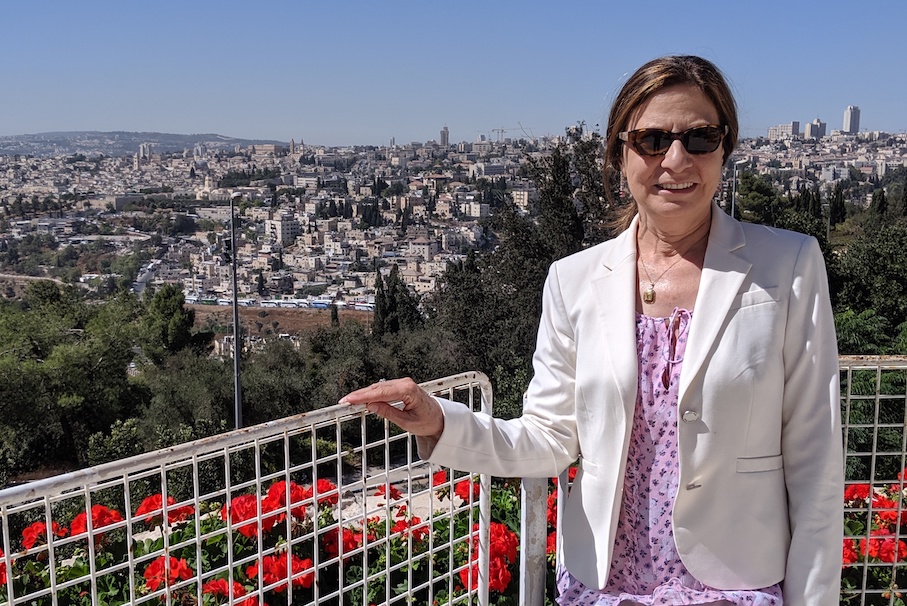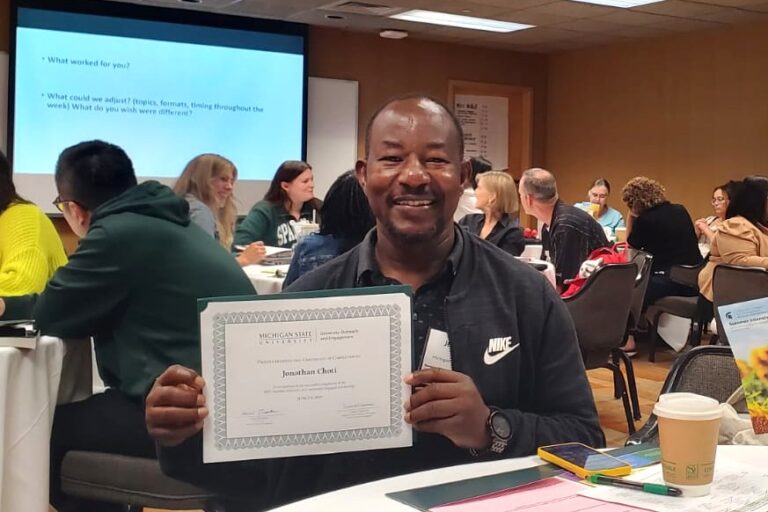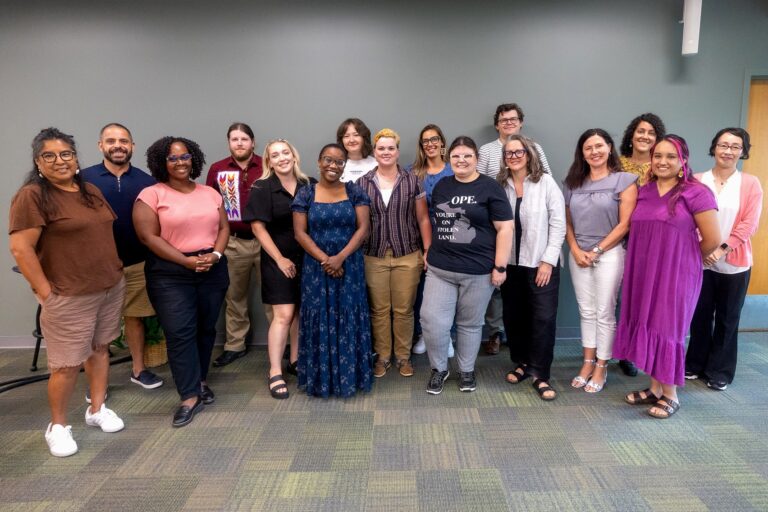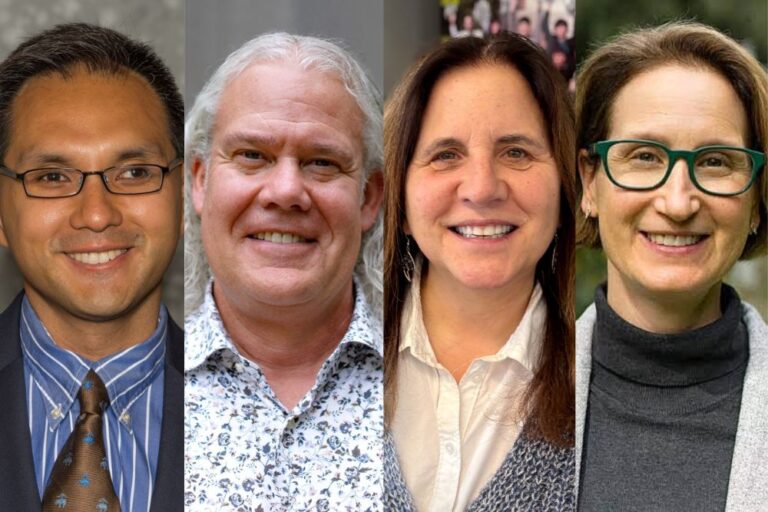For 70 years, Arabic was an official language of Israel. That changed last year with the passing of the Nation-State Bill, which became law on July 19, 2018, designating Hebrew as Israel’s only official language. How and why this decision came to be is the focus of a current study by Camelia Suleiman, Associate Professor of Arabic Studies, who was selected as a Lady Davis Visiting Professor in the Faculty of Social Sciences at The Hebrew University of Jerusalem, a prestigious fellowship that is helping support this research.
As part of the four-month fellowship, Suleiman is traveling to Israel where she is conducting research on her third book that explores the social context of Arabic in the Middle East. She hopes the book will help dispel the mystery around the decision to remove Arabic as an official language and the impact of that decision.
“I want to look at Arabic in its immediate regional context, which would be the West Bank and Jordan where Arabic is the official language in both places, and compare that to Israel and look at how we arrived at a point that removes Arabic as an official language,” Suleiman said. “Arabic has been an official language since 1922 before the establishment of the state of Israel. So why now?”
Earlier Research
The book is a continuation of Suleiman’s earlier research, which led to her first two books – Language and Identity in the Israel-Palestine Conflict: The Politics of Self-Perception in the Middle East and The Politics of Arabic in Israel: A Sociolinguistic Analysis focus on language, identity, and politics.
“Israel was established in 1948 when about 70 percent of the population was Palestinian and spoke Arabic,” Suleiman said. “At the establishment of Israel, most Palestinians became refugees. The remainders in Israel became Israeli citizens. Only my hometown remained as an Arab town. I write in my first book as to how this happened.”
It is important never to forget history. To know who you are, you have to know what your history is. In order to address conflicts and injustice, you have to expose what happened and not cover it up.
In her second book, which came out in May 2017, Suleiman investigates the problematic place of the Arabic language in Israel. She wrote the book while Arabic was an official language of Israel and when the Palestinians who remained in Israel after 1948 constituted about 20 percent of the total population. While Arabic was an official language of Israel, it also was the language of the “Arab” enemies surrounding and infiltrating Israel.
New Book Project
“I hope to develop these ideas even further with the third book,” Suleiman said. “Generally, when they talk about Arabic in Israel, or historic Palestine, they’re not talking about Hebrew and they’re not talking about the ideology behind the revivalism of Hebrew and how Hebrew became the language of Israel, but I put both side by side because we’re talking about two national projects that happen to be on the same land. I bring both and that’s my unique view. I am looking at Hebrew and Arabic equally because both languages live together.”
Suleiman is looking at the role of language and how language is played in the conflict, which is often overlooked.
“It is the less visible aspect of the conflict, and I am shedding light on that,” she said. “I am hoping to bring out the processes that made such a history so opaque today for young people and how hard it is for them to know the history of a place. It is important never to forget history. To know who you are, you have to know what your history is. In order to address conflicts and injustice, you have to expose what happened and not cover it up. The truth has to come out and you have to confront history in order for reconciliation to happen.”

Suleiman also will explore the impact made by the changing landscape of the language in this part of the world and what this has done to the identity of the Israeli Palestinians who live in Israel and who are bilingual in Arabic and Hebrew.
“You lose the historic connection to the place when you lose the language,” she said. “The things that you don’t see in Israel anymore and the names that you no longer find include the names of streets, names of villages that disappeared from the map after 1948, and the Arabic name of places.
“For instance, I grew up not far from where an important battle happened in which the crusaders were defeated in 1187. It was the Battle of Hattin. Today for new generations of Palestinians who visit this place, they have no idea. If their parents don’t tell them, they are not going to know. The sign takes the Hebrew name, which is close to the Arabic name, but it’s not the Arabic name. Thus you no longer connect to the historic place where this battle happened, which is part of the history of the place.”
A Unique Perspective
Born and raised in Nazareth with a Ph.D. in Linguistics from Georgetown University, Suleiman says she has a “unique toolkit to look into this complex situation” and is fluent in the three languages – Arabic, Hebrew and English – that have been continuously used in this part of the world.
“In many ways, I feel that this will be a homecoming because I am from there and it’s important to have voices like my voice that call for peace and for understanding and for more closeness and for both people to show their humanity rather than their conflict,” Suleiman said. “I try to make that bridge all the time.”
In many ways, I feel that this will be a homecoming because I am from there and it’s important to have voices like my voice that call for peace and for understanding and for more closeness and for both people to show their humanity rather than their conflict.
As part of her research, last year Suleiman met the lawmaker who wrote the different drafts of the Nation-State Bill.
“I wanted to hear from him why he wrote this,” Suleiman said. “At one level, we connected as two human beings, but then there was a vast void between us when he started explaining his logic behind that draft of the law. It was very stressful on me to hear some of the things he had to say, but you have to confront the other side and hear their point of view in order to create a bridge and make life worth living.”
Research Process
Suleiman plans to continue to talk to other people on both sides of the issue from all walks of life to get different perspectives. She also will do archival research during her time abroad.
“The Hebrew University library and the National library both have some of the best collections in the world of Islamic, Arabic, and Palestinian manuscripts,” she said. “I want to look into the archives to augment my research, which will combine fieldwork with archival work and with interviews of people who are concerned about the situation.”
During her time abroad, Suleiman also will make trips to the West Bank and Jordan to get a more comprehensive idea of what is happening there so as to make comparisons to Israel.
“In Israel, signs on highways and in mixed cities have to be first in Hebrew in big font, then in Arabic, then in English. The Arabic is a transliteration of the Hebrew name; it’s not the Arabic name, even though every drop of soil there had an Arabic name at some point, and the Arabic is full of spelling and grammatical mistakes,” Suleiman said. “Then when you cross the border to Jordan, the signs are first in Arabic, then English, and the Arabic is perfect, no spelling mistakes. Jordan also recently passed a law that fines people who write signs with incorrect Arabic. All this speaks volumes about the respect or lack of respect for the language.”
An Award-Winning Scholar
Suleiman has received a number of awards and recognitions for her work including a fellowship for Distinguished Women in Academia in 2000 from The Hebrew University of Jerusalem and an Maof fellowship from the Israeli Council for Higher Education.
Her earlier research on gender and race in American politics examined the styles of speech in the media of Bill and Hillary Clinton, Colin Powell, Madeleine Albright, Condoleezza Rice, and Barack Obama. This research received media attention in and outside of the United States.
Suleiman came to Michigan State University in 2012 and has led the Arabic program since then. She also has directed the Arabic Flagship Program and works with the Citizen Scholars, Muslim Studies Program, and Global Studies in the Arts and Humanities program, as well as the Asian Studies Center and the Center for Gender in a Global Context.


